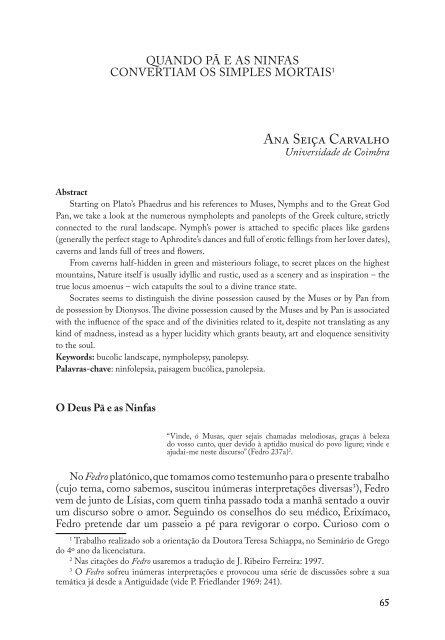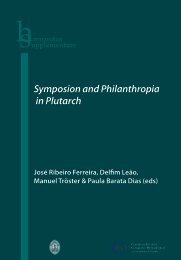Espaços e Paisagens. Vol. 1 - Universidade de Coimbra
Espaços e Paisagens. Vol. 1 - Universidade de Coimbra
Espaços e Paisagens. Vol. 1 - Universidade de Coimbra
Create successful ePaper yourself
Turn your PDF publications into a flip-book with our unique Google optimized e-Paper software.
QUANDO Pã E AS NINFAS<br />
CONVERTIAM OS SIMPLES MORTAIS 1<br />
Ana Seiça Carvalho<br />
universida<strong>de</strong> <strong>de</strong> <strong>Coimbra</strong><br />
Abstract<br />
Starting on Plato’s Phaedrus and his references to Muses, Nymphs and to the Great God<br />
Pan, we take a look at the numerous nympholepts and panolepts of the Greek culture, strictly<br />
connected to the rural landscape. Nymph’s power is attached to specific places like gar<strong>de</strong>ns<br />
(generally the perfect stage to Aphrodite’s dances and full of erotic fellings from her lover dates),<br />
caverns and lands full of trees and flowers.<br />
From caverns half-hid<strong>de</strong>n in green and misteriours foliage, to secret places on the highest<br />
mountains, Nature itself is usually idyllic and rustic, used as a scenery and as inspiration – the<br />
true locus amoenus – wich catapults the soul to a divine trance state.<br />
Socrates seems to distinguish the divine possession caused by the Muses or by Pan from<br />
<strong>de</strong> possession by Dionysos. The divine possession caused by the Muses and by Pan is associated<br />
with the influence of the space and of the divinities related to it, <strong>de</strong>spite not translating as any<br />
kind of madness, instead as a hyper lucidity which grants beauty, art and eloquence sensitivity<br />
to the soul.<br />
Keywords: bucolic landscape, nympholepsy, panolepsy.<br />
Palavras-chave: ninfolepsia, paisagem bucólica, panolepsia.<br />
O Deus Pã e as Ninfas<br />
“Vin<strong>de</strong>, ó Musas, quer sejais chamadas melodiosas, graças à beleza<br />
do vosso canto, quer <strong>de</strong>vido à aptidão musical do povo lígure; vin<strong>de</strong> e<br />
ajudai-me neste discurso” (Fedro 237a) 2 .<br />
No Fedro platónico, que tomamos como testemunho para o presente trabalho<br />
(cujo tema, como sabemos, suscitou inúmeras interpretações diversas 3 ), Fedro<br />
vem <strong>de</strong> junto <strong>de</strong> Lísias, com quem tinha passado toda a manhã sentado a ouvir<br />
um discurso sobre o amor. Seguindo os conselhos do seu médico, Erixímaco,<br />
Fedro preten<strong>de</strong> dar um passeio a pé para revigorar o corpo. Curioso com o<br />
1 Trabalho realizado sob a orientação da Doutora Teresa Schiappa, no Seminário <strong>de</strong> Grego<br />
do 4º ano da licenciatura.<br />
2 Nas citações do Fedro usaremos a tradução <strong>de</strong> J. Ribeiro Ferreira: 1997.<br />
3 O Fedro sofreu inúmeras interpretações e provocou uma série <strong>de</strong> discussões sobre a sua<br />
temática já <strong>de</strong>s<strong>de</strong> a Antiguida<strong>de</strong> (vi<strong>de</strong> P. Friedlan<strong>de</strong>r 1969: 241).<br />
65

















